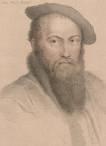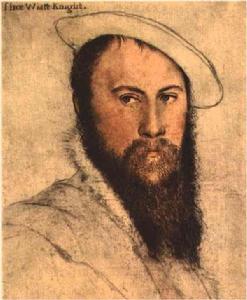簡介
 托馬斯·懷特
托馬斯·懷特Thomas Wyatt(1503-1542) was born to Henry and Anne Wyattat Allington Castle, near Maidstone, Kent, in 1503.Little is known of his childhood education.His first court appearance was in 1516 as Sewer Extraordinary to Henry VIII.In 1516 he also enteredSt. John's College, University of Cambridge. Around 1520, he married Lord Cobham's daughter Elizabeth Brooke.She bore him a son,Thomas Wyatt Jr.,in 1521.He became popular at court, and carried out several foreign missions for King Henry VIII, and also served various offices at home.
Around 1525, Wyatt separated from his wife, charging her with adultery; it is also the year from which his interest in Anne Boleyn probably dates. He accompanied Sir Thomas Cheney on a diplomatic mission to France in 1526 and Sir John Russell to Venice and the papal court in Rome in 1527. He was made High Marshal of Calais (1528-1530) and Commissioner of the Peace of Essex in 1532. Also in 1532, Wyatt accompanied King Henryand Anne Boleyn, who was by then the King's mistress, on their visit to Calais. Anne Boleyn married the King in January 1533, and Wyatt served in her coronation in June.
生平簡介
Wyatt was knighted in 1535, but in 1536 he was imprisoned in the Tower for quarreling with the Duke of Suffolk, and possibly also because he was suspected of being one of Anne Boleyn's lovers. During this imprisonment Wyatt witnessed the execution of Anne Boleyn on May 19, 1536 from the Bell Tower, and wrote V. Innocentia Veritas Viat Fides Circumdederunt me inimici mei.He was released later that year.Henry, Wyatt's father died in November 1536.
Wyatt was returned to favor and made ambassador to the court of the Holy Roman Emperor, Charles V, in Spain. He returned to England in June 1539, and later that year was again ambassador to Charles until May 1540. Wyatt's praise of country life, and the cynical comments about foreign courts, in his verse epistle Mine Own John Poins derive from his own experience.
In 1541 Wyatt was charged with treason on a revival of charges originally levelled against him in 1538 by Edmund Bonner, now Bishop of London. Bonner claimed that while ambassador, Wyatt had been rude about the King's person, and had dealings with Cardinal Pole, a papal legate and Henry's kinsman, with whom Henry was much angered over Pole's siding with papal authority in the matter of Henry's divorce proceedings from Katharine of Aragón. Wyatt was again confined to the Tower, where he wrote an impassioned 'Defence'. He received a royal pardon, perhaps at the request of then queen, Catharine Howard, and was fully restored to favor in 1542. Wyatt was given various royal offices after his pardon, but he became ill after welcoming Charles V's envoy at Falmouth and died at Sherborne on 11 October 1542.
None of Wyatt's poems had been published in his lifetime, with the exception of a few poems in a miscellany entitled The Court of Venus. His first published work was Certain Psalms (1594), metrical translations of the penitential psalms. It wasn't until 1557, 15 years after Wyatt's death, that a number of his poetry appeared alongside Surrey's in printer Richard Tottel's Songs and Sonnets written by the Right Honorable Lord Henry Howard late Earl of Surrey and other. Until modern times it was called simply Songs and Sonnets, but now it is generally known as Tottel's Miscellany. The rest of Wyatt's poetry, lyrics, and satires remained in manuscript until the 19th and 20th centuries "rediscovered" them.
Wyatt, along with Surrey, was the first to introduce the sonnet into English, with its characteristic final rhyming couplet. He wrote extraordinarily accomplished imitations of Petrarch's sonnets, including 'I find no peace' ('Pace non trovo') and 'Whoso List to Hunt'—the latter, quite different in tone from Petrarch's 'Una candida cerva', has often been seen to refer to Anne Boleyn as the deer with a jewelled collar. Wyatt was also adept at other new forms in English, such as the terza rima and the rondaeu.Wyatt and Surrey often share the title "father of the English sonnet."

